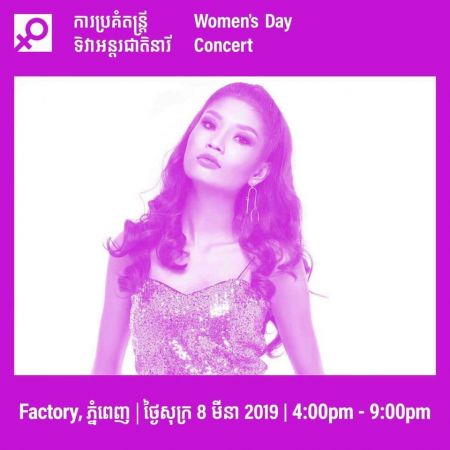
With a bunch of friends and her sister, she has hopped on her motorbike and a ferry to cross the river and come to Phnom Penh from her village on the other side. Unassuming, looking even younger than her 25 springs, Vartey Ganiva is nevertheless an important name on the new Cambodian musical scene.
"Women's Day matters a lot, of course", says the singer and songwriter who is opening the multi concert on March 8 at Factory Phnom Penh, the new coworking space and arts hub in the capital city, with other artists such as Laura Mam, Meas Soksophea or DJ Nana; "there is so much more left to do for girls and women in terms of access to education, fight against prejudices..."



Through her songwriting, Vartey has dealt with sad realities such as domestic abuse, like with "Evil Husband", a song "that came to me while hearing couples having a row in my neighborhood", or more recently utter poverty in "Live at the Dumpsite".
From her debut as a metal-punk singer, Vartey's style has evolved into an expression form more inspired by Khmer popular music from the 1960s. Her new band and her upcoming album, under the label Yab Moung, reflect this evolution: "The message, the anger is still here, but I'm looking for a musical form completely in tune with the Khmer language, with our cultural references", she comments with her luminous smile; "something like new Khmer rock. I mean, I like Korean pop and all that but these bands end up sounding the same, looking the same, and to me a global world shouldn't be bland, humdrum."
Music as a way to channel frustrations, aspirations, dreams: Vartey sees that in her work with the NGO Moms Against Poverty, where she helps Cambodian teens to master the musical medium. "It's incredible, how they can release and overcome their anger through music", she remarks.


Vartey herself started to sing and compose in her childhood. Fact is art runs deep in the family: her father is a confirmed visual artist, he and her mother love to sing, and her great-aunt, Oum Sophany, whom she called "Yeeyay" (Grandma, in Khmer), has written two acclaimed novels set during the country's somber era of the 1970s and 1980s (read an interview with the writer and poetess here).
Maybe the sense and the pride of being a woman, within a lineage of strong and creative women, could be a way to fence off loneliness, much like music? The chorus of Vartey's latest song lingers after she goes off into the night of a vibrant city:
"We are all living in the same town / All alone / We are living in the same world / All alone."



